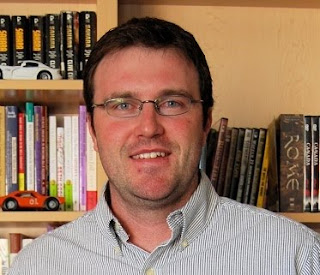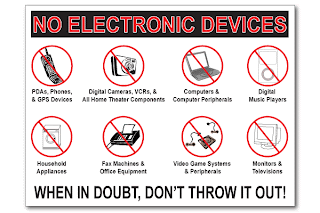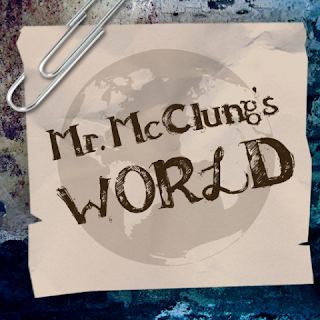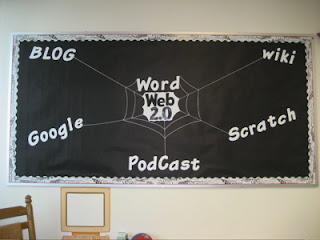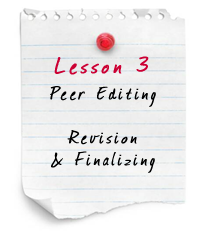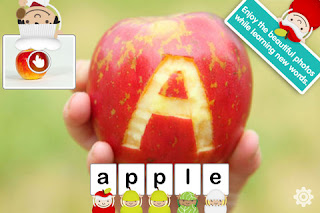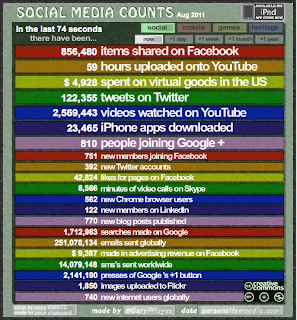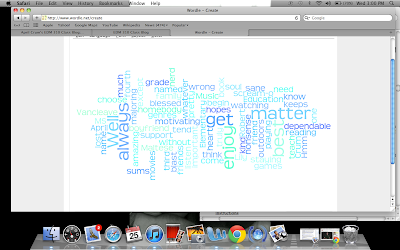Sunday, May 6, 2012
Finally Finished!!!
Collaboration Report
For the last two projects in EDM 310, I was in a group with Shaun Coleman, Brooke Ladnier, and Jeanette Kelly. They were so great to work with! Trying to find times to meet was the biggest obstacle we had, but we overcame that, easily. We met face-to-face and we also skyped with one another for the second project. Skype was the most convenient tool because we were able to do it from home. We played around with the Google chat, but Skype was our preferred communication tool. We didn’t think to take a screen shot or video of our virtual meetings because we were too focused on deciding how we were going to do our projects. That would’ve come in handy for this post! Nonetheless, we wouldn’t have been able to complete our final projects without the use of skype.(I couldn't fit Shaun's Skype profile in the screen shot!)
Sunday, April 29, 2012
C4T Summary
For my final C4T I commented on Joe Bower’s blog. He updates his blog almost everyday, so I’ve had several different posts to choose from. The first week I read his blog entitled Redford’s Broken Promise? This post was about Alison Redford who was running in the 2011 Progressive Conservative Leadership Race. Joe voted for her because she promised to eliminate the 3rd and 6th grade Provincial Achievement Tests. This election was over six months ago and the tests are still there. He mentions holding up his end of the bargain by voting for her, but she has yet to abolish these tests. He makes a good point at the end of his post: “And if she doesn't and this is indeed a broken promise, what good are Alison Redford's promises in this new election?” I replied back with agreeing with what Redford said about these tests. They are too stressful on these students and they are not the best tools for determining these children’s performance. I was apologetic towards him for the lack of progress. I also agreed with him about her being filled with broken promises going into this new election.
This week Joe wrote a post about social networking. This post was called The Denial of Social Networking. This post is about blocking YouTube, Facebook, and Twitter from schools. People are under the impression that children come out of the womb knowing how to use all the different social sites. That is ignorant. Children have to learn how to use them just like everyone else. He makes a valid point about the repercussions of banning these sites: “If a school blocks YouTube, Facebook and Twitter, how are teachers suppose to learn about social networking? If a school blocks YouTube, Facebook and Twitter, how are teachers suppose to teach students how to use social networking appropriately? If a school blocks YouTube, Facebook and Twitter, how are teachers suppose to teach students how to NOT use social networking inappropriately?” Teachers can educate their kids on how to navigate these sites properly and responsibly. I responded with getting rid of these sites is going to do more harm than good. When children are told not to do something, they’re going to find a way to do it. They’re rebellious and curious. As teachers we should take advantage of the opportunity to teach them how to use these sites in a responsible manner.
This week Joe wrote a post about social networking. This post was called The Denial of Social Networking. This post is about blocking YouTube, Facebook, and Twitter from schools. People are under the impression that children come out of the womb knowing how to use all the different social sites. That is ignorant. Children have to learn how to use them just like everyone else. He makes a valid point about the repercussions of banning these sites: “If a school blocks YouTube, Facebook and Twitter, how are teachers suppose to learn about social networking? If a school blocks YouTube, Facebook and Twitter, how are teachers suppose to teach students how to use social networking appropriately? If a school blocks YouTube, Facebook and Twitter, how are teachers suppose to teach students how to NOT use social networking inappropriately?” Teachers can educate their kids on how to navigate these sites properly and responsibly. I responded with getting rid of these sites is going to do more harm than good. When children are told not to do something, they’re going to find a way to do it. They’re rebellious and curious. As teachers we should take advantage of the opportunity to teach them how to use these sites in a responsible manner.
Final PLN
For my PLN I used Symbaloo. I really liked how organized it was! It was convenient to just click on the website I wanted to go to. Safari already has a window that has all of your latest wesites that you have viewed, but not as the homepage. I made Symbaloo my homepage, so I was one click away from my desired website. It's nice to not have the hassle of typing the website into the browser. Another characteristic I have enjoyed about Symbaloo has been the fact that I can arrange my icons any way I please. All of my popular sites are on the right, and the ones I don't use as much are on my left. I will definitely encourage my students to use Symbaloo, or a website like it, when we are using the computers for projects, blogs, or podcasts. The great thing about it is that they can use it at home or at school!
Blog Assignment 13
E-Media Fast:
I started my 24-hour electronic restriction Friday night around 10 o’clock. The reason I started this late was because I went to the Shinedown concert and I knew I would need my phone/camera. It wasn’t as bad as I thought because I went to sleep when I got home and I was pretty busy all day Saturday with family events. However, it was rough not getting on FaceBook or taking pictures. Lucky for me, my mom is an amateur paparazzi and managed to take lots of photos. Another struggle for me was no television. I can’t go to sleep without the T.V. I wasn’t sure if this was cheating, but my boyfriend turned on his audio book of “The Hunger Games” and that’s how I fell asleep. Technically, it wasn’t me using the electronic device, just mooching off of someone else’s. Those were my only struggles. I kept my phone upstairs in my room while I spent the day with my family out on the boat, and I went to sleep around 9 o’clock on Saturday since we woke up at 5 o’clock in the morning to go fishing. I didn’t realize how dependent I was on electronic devices, until I couldn’t use them.
When I was in elementary school, I remember doing a no television challenge for a week. Your parents had to initial next to each day their child did not watch television. I completed the challenge, but mainly because parents wouldn’t let me watch T.V. If it were up to me, I would have given in the moment I got home from school. I hate to be a pessimist, but if I were to give my students this task today they would, more than likely, fail. I don’t know how children survive without their video games, cell phones, television, or MP3 players. Often times, parents encourage these electronics to keep their kids from acting up. Whatever happened to good ole fresh air and hard copy books? I would challenge my students to restrict themselves from a certain electronic device a week. Once they have successfully completed each task, I would have an optional assignment to restrict themselves from all electronics for 5 school days. Whoever completes this task would be rewarded with no homework for a week, or something along those lines. It’s not a bad idea to get them to resort to other forms of entertainments.
I started my 24-hour electronic restriction Friday night around 10 o’clock. The reason I started this late was because I went to the Shinedown concert and I knew I would need my phone/camera. It wasn’t as bad as I thought because I went to sleep when I got home and I was pretty busy all day Saturday with family events. However, it was rough not getting on FaceBook or taking pictures. Lucky for me, my mom is an amateur paparazzi and managed to take lots of photos. Another struggle for me was no television. I can’t go to sleep without the T.V. I wasn’t sure if this was cheating, but my boyfriend turned on his audio book of “The Hunger Games” and that’s how I fell asleep. Technically, it wasn’t me using the electronic device, just mooching off of someone else’s. Those were my only struggles. I kept my phone upstairs in my room while I spent the day with my family out on the boat, and I went to sleep around 9 o’clock on Saturday since we woke up at 5 o’clock in the morning to go fishing. I didn’t realize how dependent I was on electronic devices, until I couldn’t use them.
When I was in elementary school, I remember doing a no television challenge for a week. Your parents had to initial next to each day their child did not watch television. I completed the challenge, but mainly because parents wouldn’t let me watch T.V. If it were up to me, I would have given in the moment I got home from school. I hate to be a pessimist, but if I were to give my students this task today they would, more than likely, fail. I don’t know how children survive without their video games, cell phones, television, or MP3 players. Often times, parents encourage these electronics to keep their kids from acting up. Whatever happened to good ole fresh air and hard copy books? I would challenge my students to restrict themselves from a certain electronic device a week. Once they have successfully completed each task, I would have an optional assignment to restrict themselves from all electronics for 5 school days. Whoever completes this task would be rewarded with no homework for a week, or something along those lines. It’s not a bad idea to get them to resort to other forms of entertainments.
Sunday, April 22, 2012
Creativity and Curiosity: My Thoughts-- Special Post #12A
Dr. Strange asked us to come up with questions related to creativity, curiosity, and education. He got lots of great questions back, and I want to address them. I will be answering questions dealing with curiosity with students and how teachers can maintain that curiosity in the classroom, can a curriculum be developed to increase the creativity of students, and can other educators help out with getting children more curious.
When asked the question: Do schools in the United States systematically destroy (or inhibit) the development of curiosity and/or creativity in students? If yes, why does that happen? If no, how do you counter the argument of Sir Ken Robinson that schools do undermine the development of creativity in students? No, I don’t think the schools prevent the children from being creative. Sure, there are rules they must follow that may not allow them to achieve their most creative ideas, but they can use their creativity to modify it and make it acceptable. Some kids don’t necessarily lack creativity; they’re just lazy. I struggle with this, myself. Almost all children are curious, and I don’t think the schools cripple them from wondering or prying.
Can a curriculum be developed that increases the curiosity of students? If so, what would be the key components of such a curriculum? Teachers do everything they can to spark interest in their students. It takes a very creative educator to be able to target the interests of all their students and make them interested. Children would rather do anything than sit in a classroom. When I was in high school, my English teacher would take us outside and we would read. Sometimes that’s all students need—a little fresh air. As I’ve mentioned before, I think using games to get children involved is a great way to hold their interest and ignite their curiosity.
Can a teacher's actions increase the curiosity of students? If so, what would be those actions? Absolutely! If I was to walk into my classroom with a box in my arms and I was be very protective of it, my students would definitely be curious. Inside that box could be their favorite math game, or a movie that could relate to our history lesson. It’s not so much what is in enclosed in the box, but the fact that I have a “surprise”. I could also “bribe” them with a surprise at the end of class if they behaved. That surprise could be 5 extra minutes of recess or homework passes. Children need incentives every now and then to hold their attention and keep them interested.
What would help you become more creative? What role would teachers and/or schools have in that process? I think creativity is a gift and not everyone is blessed enough to have it. However, there are ways to apply new, creative ideas in the classroom. I also believe it is a group effort. There is always going to be a teacher that goes the extra mile and does have the creative juices flowing constantly. They can use this to their advantage and inform other teachers so they can get involved as well.
These responses are my opinion, of course, but I appreciate the questions because it really got me thinking. I think teachers get too wrapped up in teaching the material, and don’t pay attention at whether or not the children understand it. We need to mix it up a bit and try new things. I’ve learned several different ways to hold the attention of my students. I just hope they wont be the only methods and I will continue to learn and/or create new ways to educate.
Progress Report for Final Project
Brooke, Jeanette, Shaun, and myself skyped Saturday morning at 11:30 and we'll be getting together on Thursday, April 26th, to finish everything up. We decided that we are going to teach a math lesson for kindergarten students. I have learned several different games in my HS class, and how to modify them for all ages. We are going incorporate the use of beanbags and hula hoops to help keep their interest. There are two different games we are going to play that will help the children with their math skills. You will have to stay tuned to see what the mystery games are!
C4K Summary
For the month of April we were assigned to the same child for three weeks. The little girl I was assigned to was Hailee. Hailee didn’t have many posts, but the ones she did have were awesome. She had a Prezi as one post, a Voki for another, and her first post was her name and her interests.
Her Prezi included different activities she enjoyed doing, some interesting facts about her and her appearance, and some of her favorite hobbies. I was very impressed with her Prezi, especially because I had the option to do one, but opted out because it seemed complicated. After seeing hers, I wish I had chose to do it! It was very informative, and organized. I complemented her Prezi and told her that I wished I had tried it.
Her Voki was an avatar and it said: “My name is Hailee and I like basketball.” There wasn’t much to it, but I did tell her it was neat and that her avatar was very pretty. It looked a lot like the person she described in her Prezi. I also asked her if she played basketball for her school and who her favorite team was.
Her first post only said “Hi my name is Hailee. I like sports and running. :)” She had a penguin game on the side of her blog that I played for about 3 minutes. I have a strange obsession with pengies, which is what I call them, and I told her that I LOVED her game. I also asked her what other sports she played besides running and I also mentioned that I wish I enjoyed it; I’d be in a lot better shape!
My last C4K post was today and I was assigned to a little boy named Tom. Tom made a video and talked about what he did over the weekend. Apparently, his dad bought him a PSP and he played with it all weekend. He also got some new games to go along with it. I told him that I bet it was exciting to get such a cool gift, and I talked about how the gaming world has changed since I was his age. I also asked him what games he got. He had a paint drawing that he uploaded and I complemented that, as well.
Blog Assignment 12
For this weeks blog post, we were supposed to come up with our own assignment and complete it. This is the assignment I chose to do:
Watch Room for Improvement. Discuss ways to get America back on top in the educational world.
Room for Improvement:
The Secretary of Education, Arne Duncan, discusses how we need to get back to being the America we used to be. We need to take charge and push our citizens and test their potential. He mentions that he wants America to be the number one country that has college graduates, again. He also mentions that technology is another area where America has been passed up. Schools in other countries have implemented technology in their ways of teachings, and it has amazing results. Sure, there are schools in the United States that use different forms of technology, but we are nowhere close to the schools overseas. We are extremely capable of getting computers in every school and really taking advantage of all the different forms of technology.
We have watched several different videos and read numerous blog posts on how technology is becoming a necessity in schools. Sure, there are teachers who rather teach the way they've been teaching for years, and they don't do well with change. Unfortunately, times are changing and we have to get up to date with the different forms of technology and how we can benefit from them. Blogging helps students learn about different cultures, improves their grammar, and gives them the opportunity to interact with other students from other schools. Podcasts allow the students to get their ideas out there. The upside to podcasting is that it can be uploaded automatically and you don't have to tune in weekly. There are different forms of technology that intrigue different types of students and their interests. I've learned so much about technology and how to properly use it in the school setting, and I have every intention of implementing them in my classroom.
Watch School? There’s an app for That! Discuss the advantages that come with cell phones and how we can use them in the classroom.
School? There's an app for That!
Arne Duncan was dead on when he said students lose lots of things, but never their cell phones. We are growing up in a generation where we are dependent on cell phones. It’s hard to imagine how people survived without them. Children of all ages own a cell phone. Since they are going to use them anyways, why not make them beneficial in the classroom? This goes along with the iSchool video we had to watch a few weeks back. We can set up applications students can use at home and in the classroom. They can upload their homework assignments, view classroom lectures when they’re absent, view study guides, and so many other things. Instead of trying to find a way to keep cell phones out of the school, let’s try and find a way to use them!
Watch Room for Improvement. Discuss ways to get America back on top in the educational world.
Room for Improvement:
The Secretary of Education, Arne Duncan, discusses how we need to get back to being the America we used to be. We need to take charge and push our citizens and test their potential. He mentions that he wants America to be the number one country that has college graduates, again. He also mentions that technology is another area where America has been passed up. Schools in other countries have implemented technology in their ways of teachings, and it has amazing results. Sure, there are schools in the United States that use different forms of technology, but we are nowhere close to the schools overseas. We are extremely capable of getting computers in every school and really taking advantage of all the different forms of technology.
We have watched several different videos and read numerous blog posts on how technology is becoming a necessity in schools. Sure, there are teachers who rather teach the way they've been teaching for years, and they don't do well with change. Unfortunately, times are changing and we have to get up to date with the different forms of technology and how we can benefit from them. Blogging helps students learn about different cultures, improves their grammar, and gives them the opportunity to interact with other students from other schools. Podcasts allow the students to get their ideas out there. The upside to podcasting is that it can be uploaded automatically and you don't have to tune in weekly. There are different forms of technology that intrigue different types of students and their interests. I've learned so much about technology and how to properly use it in the school setting, and I have every intention of implementing them in my classroom.
Watch School? There’s an app for That! Discuss the advantages that come with cell phones and how we can use them in the classroom.
School? There's an app for That!
Arne Duncan was dead on when he said students lose lots of things, but never their cell phones. We are growing up in a generation where we are dependent on cell phones. It’s hard to imagine how people survived without them. Children of all ages own a cell phone. Since they are going to use them anyways, why not make them beneficial in the classroom? This goes along with the iSchool video we had to watch a few weeks back. We can set up applications students can use at home and in the classroom. They can upload their homework assignments, view classroom lectures when they’re absent, view study guides, and so many other things. Instead of trying to find a way to keep cell phones out of the school, let’s try and find a way to use them!
Friday, April 13, 2012
Blog Assignment 11
I thought it was neat and thoughtful for Ms. Cassidy to take the time to Skype with EDM 310. The first topic I want to address is how to make this experience safe for the kids. I like that they give out waivers for the parents to sign at the beginning of the year. She took all the necessary safety precautions, and I appreciated that. I like that she doesn’t match a face with a name or provide the last names of any of her students. As far as how the parents feel about it, they enjoy seeing their children working and the fact their kids are having fun while doing it. She is spot on when she says technology isn’t going anywhere. We can’t teach children the same way we used to. We have all the tools and we just need to use them.
I have really enjoyed my blogging in this course. Ms. Cassidy mentions that she likes the audience that comes along with blogging. Children enjoy seeing their work being read. I would like to also use a blog site that shows their page reads. I think that it will be encouraging for my students. Also, I like the interaction between the two schools. Even though they are required to comment on each other’s blog, they are getting to know each other and helping each other at the same time.
I agree with Ms. Cassidy when she says that teachers need to be technology literate. Technology will be forever changing and we need to be acclimated with all the new types of technology that are coming out. It’s a learning experience for everyone. There are some things the children may know more about, and they can teach us. We don’t always have to be the ones educating. She makes a good point about where to start with technology. It’s always good to start with what you’re interested in.
Ms. Cassidy had such great answers to all of the questions. I wish I could have been around to be able to interact with her and take part in this process. A question I would have liked to ask would be is there a bigger involvement with students wanting to learn since she started implementing technology in her teaching? I really enjoyed this assignment and hearing her thoughts on technology in schools and how we need to get more involved with it.
Sunday, April 8, 2012
Blog Assignment 10
Do You Teach or Do You Educate:
What’s the difference between teaching and educating? Some think they are one in the same. Boy, are they wrong. As it was mentioned in the video , to teach means to show or explain how to do something, encourage someone to accept as a fact or principle, give information about or instruction in, cause someone to learn or understand something, and/or induce by example or punishment to do or not to do something. But to educate someone means to illuminate, inspire, and empower them, be their mentor, advisor, and counselor, show them guidance, morals, and practice integrity. So what would you rather be— A teacher or an educator?
Based off this video, being a teacher doesn’t sound half bad, but why would you want to settle? As aspiring teachers we should strive to be educators! I believe being an educator is being a teacher, but also being like a parent. Most children see their teachers more during the day than their parents. As educators we need to demonstrate integrity, trustworthiness, good morals, and guidance. We need to inspire, encourage, and motivate these children everyday. I like the quote at the end of this video : Education is the kindling of a flame, not the filing of a vessel. Yes, I want to be a teacher, but I, also, want to be more than that. I want to be an educator.
Tim Johnson's Don't Let Them Take The Pencils Home:
I liked the creativity Mr. Johnson used with this post. At first when I read our blog post assignment, I thought to myself: “Don’t let them take the pencils home? Who cares if they take pencils home?” However, the message Mr. Johnson was trying to get across had nothing to do with taking home pencils, but everything to do with having a problem and being able to overcome it with patience, solutions, and a level head. Far too often teachers hold their students back due to negativity, rules, or sometimes laziness. We need more teachers that will go the extra mile to help these children reach their maximum potential.
I understand that teachers stress over test outcomes, and I understand how important tests are. But on the other hand, not all tests show how smart a child is, or how well they understand the material. Many children, and people in general, have a test anxiety. I used to get so nervous before a test and forget everything I studied. But that didn’t mean I didn’t understand what I was being taught. Overcoming obstacles like that come with getting older and learning how to adjust to it. For the most part, tests are a great way to determine how the children are doing in certain subjects, but it’ not the only option.
Another thing I liked about this post was how positive and encouraging "Mr. Spencer" was. Teaching can be frustrating, and even discouraging, at times. But the important thing to remember is these kids need all the motivation and kind words they can get. Some children only hear positive things from their teacher, and some hear it at home, too—Not all kids are that lucky. Just like with our blogs, I think we should point out the positive first, and then give some constructive criticism. I think some of the students and workers forget that. Coming at someone with only ways to fix their work, but no encouragement or positive notes can discourage anyone.
Finally, I liked that "Mr. Spencer" tried to incorporate games to help these kids learn. Learning can be fun, and I think some educators lose sight of that. He mentioned the use of hangman. Well, I think hangman can definitely be used in the classroom to help test children’s knowledge without having to give them a piece of paper with 25 questions on it. Teachers can ask a history question on the board, draw the hanging stand, and call upon children who raise their hand to answer the question. There are so many different ways to help these children, and most of them are fun and will hold their interest. We just have to be the educators who want to help these kids, no matter what it takes!
What’s the difference between teaching and educating? Some think they are one in the same. Boy, are they wrong. As it was mentioned in the video , to teach means to show or explain how to do something, encourage someone to accept as a fact or principle, give information about or instruction in, cause someone to learn or understand something, and/or induce by example or punishment to do or not to do something. But to educate someone means to illuminate, inspire, and empower them, be their mentor, advisor, and counselor, show them guidance, morals, and practice integrity. So what would you rather be— A teacher or an educator?
Based off this video, being a teacher doesn’t sound half bad, but why would you want to settle? As aspiring teachers we should strive to be educators! I believe being an educator is being a teacher, but also being like a parent. Most children see their teachers more during the day than their parents. As educators we need to demonstrate integrity, trustworthiness, good morals, and guidance. We need to inspire, encourage, and motivate these children everyday. I like the quote at the end of this video : Education is the kindling of a flame, not the filing of a vessel. Yes, I want to be a teacher, but I, also, want to be more than that. I want to be an educator.
Tim Johnson's Don't Let Them Take The Pencils Home:
I liked the creativity Mr. Johnson used with this post. At first when I read our blog post assignment, I thought to myself: “Don’t let them take the pencils home? Who cares if they take pencils home?” However, the message Mr. Johnson was trying to get across had nothing to do with taking home pencils, but everything to do with having a problem and being able to overcome it with patience, solutions, and a level head. Far too often teachers hold their students back due to negativity, rules, or sometimes laziness. We need more teachers that will go the extra mile to help these children reach their maximum potential.
I understand that teachers stress over test outcomes, and I understand how important tests are. But on the other hand, not all tests show how smart a child is, or how well they understand the material. Many children, and people in general, have a test anxiety. I used to get so nervous before a test and forget everything I studied. But that didn’t mean I didn’t understand what I was being taught. Overcoming obstacles like that come with getting older and learning how to adjust to it. For the most part, tests are a great way to determine how the children are doing in certain subjects, but it’ not the only option.
Another thing I liked about this post was how positive and encouraging "Mr. Spencer" was. Teaching can be frustrating, and even discouraging, at times. But the important thing to remember is these kids need all the motivation and kind words they can get. Some children only hear positive things from their teacher, and some hear it at home, too—Not all kids are that lucky. Just like with our blogs, I think we should point out the positive first, and then give some constructive criticism. I think some of the students and workers forget that. Coming at someone with only ways to fix their work, but no encouragement or positive notes can discourage anyone.
Finally, I liked that "Mr. Spencer" tried to incorporate games to help these kids learn. Learning can be fun, and I think some educators lose sight of that. He mentioned the use of hangman. Well, I think hangman can definitely be used in the classroom to help test children’s knowledge without having to give them a piece of paper with 25 questions on it. Teachers can ask a history question on the board, draw the hanging stand, and call upon children who raise their hand to answer the question. There are so many different ways to help these children, and most of them are fun and will hold their interest. We just have to be the educators who want to help these kids, no matter what it takes!
Sunday, April 1, 2012
C4K Summary
Since we’re only required to comment about last weeks C4K assignment, that’s the only one I’m going to include. Last week I was assigned to Class 12’s Blog by Louie and Klaudia. Their class was writing a story and each group had to feed off of the previous post to make the story and challenged to hit 100 words. They were blogging about the titanic spider. The spider was a butler and overheard a little girl saying they were going to sink. I complimented them on their imagination and how well the story flowed. I also congratulated them on achieving the 100-word goal. I enjoyed reading the different stories and how well they flowed together.
C4T Summary
I was assigned to Joe Bower for my C4T this month. He is a teacher from Alberta, Canada. He prefers the “old school” teaching, with a hint of the new, technological stuff. His first post was Test the Students, Punish the Teachers. He was writing about an article that fired teachers whose students failed standardized tests. It doesn’t matter how well the teachers do on all the other aspects of teaching. They are considered ineffective overall if they do not raise their students test scores. I responded to his post by saying the pressure is already too much for a new, young teacher, but the possibility of be fired because the students test scores aren’t have enough is unbearable. I also mentioned that it’s a good thing a teacher’s ability to teach isn’t based solely on test results.
Joe’s second post was Death by Wikipedia. This post was about the extinction of encyclopedias, and the up rise of Wikipedia. It was a very short post, but I responded with the pros and cons of Wikipedia. One of the pros being that Wikipedia is free, but a con was it not being 100% accurate, since anyone can post on it.
Blog Assignment 9
My first selection of Mr. McClung’s was the one written after his first year of teaching entitled What I’ve Learned This Year (2008-09). In this post Mr. McClung discusses the great difference in his expectations and the real world. I believe this exists in all professions but most especially in teaching where I expect the expected to change every year and still be wrong. The clear message in this post was the disconnect between what is learned during school and internships and actual teaching. As we go through school we look to meet the grading systems of those evaluating us and as educators our evaluations change quite a lot. There is no more set presentation that we must get through and show our use of certain teaching skills, it is simply to educate however that may be best achieved. Mr. McClung also discusses the necessity of communication with other teachers and the students themselves to truly grow from the experiences. He also discusses the valuable role of technology in the classroom and the fears that many have of approaching this unknown land. Through all of this he continues to reiterate on the failure of your expectations and how little they must affect you. As a teacher each and every student will be different in what they bring to the table and how best they learn. This presentation of experiences from someone who just experienced their first year as a teacher shed a lot of light on what I can expect. Experiences of others help us not to think we are the freak in the crown and I hope that I can recount this blog during my early failures I am sure to face.
The second reading of Mr. McClung’s blog I selected was his second year What I Learned This Year (2009-10) which I selected because I was anxious to see his transition from first year teacher to second year teacher. Mr. McClung was unable to remain in his comfort of experiences in the first year and transitioned to older students and teaching multiple subjects. He reiterates the need for flexibility as his students entire set of mind had changed as the group was more mature. The flexibility was also needed on his part due the complete change of scene. Not only changing schools and grades Mr. McClung was forced to change subjects from the hands on science to the classical memorization and note taking classes of history and social studies. His attitude towards flexibility was needed as he tried to make the subject more involved only to discover that few of the students had actually been thought to think independently as current events were discussed. With some coaxing some results were found but he also found a wall in having to leave his personal opinions behind and direct discussion instead of lead it. Through all of the new experiences Mr. McClung gives a valuable tip in befriending a teacher with experience in the school to help guide you through the early days. Another point made is that during his change Mr. McClung entered the world of “too cool to care” attitudes found in young adults. Leaving the ego at the door and showing passion about the subject are valuable skills he found in making the students show interest as well. Many of daily duties of teachers like handing out papers waste time and lose attention of the class that must be regained. Simple things like letting students get their own papers and other small tasks save time and effort as Mr. McClung pointed out in his blog. Another point of view addressed is that of the management of the job itself. Mr. McClung mentions bad administration hurting the quality of his teaching and the priority that must be made for the students not to allow this to affect the quality they receive. They in fact are the customers and only ones hurt by teachers who allow other issues into the classroom.
All of these experiences continue to awaken me to the world outside of learning to be a teacher. I guess we all have this grand idea of walking into a classroom of students ready to hear what we have to say and learn from the way we mean them to. We don’t think about the attitudes we are going to face and the challenges that are going to arise when we fail or are challenged in ways we did not expect. Mr. McClung has given me great insight into this and a heads up for what is to come. Who thinks about a bad boss as a teacher? I know that I surely never thought about having to deal with the rest of the faculty in a negative way. In the end I can clearly see that I will have to be flexible and very self assessing to be a successful teacher. For the students to learn I must in fact learn myself.
The second reading of Mr. McClung’s blog I selected was his second year What I Learned This Year (2009-10) which I selected because I was anxious to see his transition from first year teacher to second year teacher. Mr. McClung was unable to remain in his comfort of experiences in the first year and transitioned to older students and teaching multiple subjects. He reiterates the need for flexibility as his students entire set of mind had changed as the group was more mature. The flexibility was also needed on his part due the complete change of scene. Not only changing schools and grades Mr. McClung was forced to change subjects from the hands on science to the classical memorization and note taking classes of history and social studies. His attitude towards flexibility was needed as he tried to make the subject more involved only to discover that few of the students had actually been thought to think independently as current events were discussed. With some coaxing some results were found but he also found a wall in having to leave his personal opinions behind and direct discussion instead of lead it. Through all of the new experiences Mr. McClung gives a valuable tip in befriending a teacher with experience in the school to help guide you through the early days. Another point made is that during his change Mr. McClung entered the world of “too cool to care” attitudes found in young adults. Leaving the ego at the door and showing passion about the subject are valuable skills he found in making the students show interest as well. Many of daily duties of teachers like handing out papers waste time and lose attention of the class that must be regained. Simple things like letting students get their own papers and other small tasks save time and effort as Mr. McClung pointed out in his blog. Another point of view addressed is that of the management of the job itself. Mr. McClung mentions bad administration hurting the quality of his teaching and the priority that must be made for the students not to allow this to affect the quality they receive. They in fact are the customers and only ones hurt by teachers who allow other issues into the classroom.
All of these experiences continue to awaken me to the world outside of learning to be a teacher. I guess we all have this grand idea of walking into a classroom of students ready to hear what we have to say and learn from the way we mean them to. We don’t think about the attitudes we are going to face and the challenges that are going to arise when we fail or are challenged in ways we did not expect. Mr. McClung has given me great insight into this and a heads up for what is to come. Who thinks about a bad boss as a teacher? I know that I surely never thought about having to deal with the rest of the faculty in a negative way. In the end I can clearly see that I will have to be flexible and very self assessing to be a successful teacher. For the students to learn I must in fact learn myself.
Monday, March 26, 2012
Saturday, March 24, 2012
Blog Assignment 8
This is How We Dream: Part 1 & 2:
Richard E. Miller discusses the past conventions, current practices and possible futures of using multimedia and the web to enhance the possibilities of the writing culture in his lecture This is How We Dream. As our technology advances the abilities of sharing information has become nearly instantaneous and available everywhere to anyone.
With the tools currently available the former need for purchasing or loaning a book out has disappeared and writing tools have grown from words in print to digital displays full of text, images, sound and video. The diversity of these documents allows for the stimulation of thought through multiple senses as well as the ability to enhance an emotional response with a separate form of media that may not have been evoked through the use of solely words or images.
The lecture also discusses the benefits of the instantaneous publishing of an idea through the use of the web. Be these ideas an article, blog post or video posted it is available to be seen by everyone at the moment of its publication. There is no longer the delay of up to years of the writing, copyright and publishing process. These ideas also come free of charge as information and ideas can be shared as they are meant to be to stimulate further discussion and in turn lead to advancements in whatever facet the given idea approaches.
The author presents valid points about the use of multimedia to share ideas and stimulate thought through the use of multiple stimulations. However, while these forms of presenting writing do allow an author to convey their idea more clearly it also takes away some of the freedom of thought that a reader experiences. We must be careful not to over direct thought and allow for independent interpretation. If we are not careful we will approach the thought process of: “Why write a fiction novel when I could just make a movie?”
Personally, I am prepared to write in this manner and have done so regularly through my education process. Using tools like slide shows to give a presentation are a form of such writing and with more and more As for the ability of the future students of our education system being able to utilize these methods of writing it is fairly clear that they will be more than adept. While a great writer does not lie within each person, everyone can in fact write once taught the general tools. The tools of the multimedia writing are already integrated into our society as children are exposed to more and more advanced technology at younger and younger ages. It must just be conveyed to the student the proper way to utilize the tools just like grammar teaches us to properly use words.
Blog Post #12:
Carly Pugh has designed an assignment in her Blog Post #12 that gives teaching an in depth exercise into the ideas of Dr. Miller in the use of multimedia to write. Dr. Miller urges that these practices allow for a much more in depth expression of the author’s ideas and this is clearly seen through Carly’s post. While reading the post there are links throughout that allow the reader to take a look into her meaning behind the words that she is using. This could be done through length descriptions and stories and the same effect may or may not be reached. However, with the use of the videos that are linked throughout the post, the reader is able to understand and be stimulated in the way that the author desired. While this less classical form of writing may lack on the literary elements, it does achieve similar effects. As Dr. Miller expressed in his lectures this is a much better use of the tools at the hands of a teacher. Today’s world is a digital world, especially those currently in and entering into the education system, whose attention is grabbed by colors, video and sound and writings, such as this blog post, directly address this new and technologically advanced audience.
EDM 310 is Different
After watching the videos The Chipper Series and EDM310 for Dummies I was inspired in the direction of instructional videos. One of the primary tools that we utilize in EDM310 is Blogger. I’ve come across blogs while in this class, both student and non-student, that lack in creativity in term of visual stimulation. Personally, I have enjoyed putting a personal touch into the way my blog looks with backgrounds, fonts and the embedding of text and video. I think it would be a useful tool to produce an instructional video using screen and voice recording to walk users through this program. While the tools are simple to use some may not have the desire or knowledge to find these tools, nor how to use them to their full potential.
The Chipper Series is an interesting parody on the many misconceptions that students carry and the consequences that can come from life lived under these misconceptions. Chipper begins with the simple mistakes of not applying herself in school and taking as many shortcuts as she possibly can. After leaving school she continues these bad habits of taking the easy way out and a sense of entitlement. Many of these misconceptions come from society thinking that things should be handed to us just for showing up or paying our tuition. However, when extended into the real world these lead to failure. Through the course of the series, Chipper just slides downhill from student to garbage collector and in the end realizes the error of her ways and returns to school with a newfound desire to apply herself. Overall we see the message that education and application of one’s self to the task at hand is what is required for success.
While masked behind a promotional ad for a book, EDM310 for Dummies carried a different message to me. I have yet to think about the many programs and tools that I have learned through this class and the benefits that these will provide to me as tools in my future teaching. During this class I have found a use beyond shopping and social networking on the internet. I previously had little knowledge of the scholarly uses of such programs and the niche that they are gaining in today’s education system. I cannot wait to apply these programs beyond this class and extend my student’s future learning experiences through their use.
Learn to Change, Change to Learn:
In Learn to Change, Change to Learn there are interesting and valid arguments made for movement away from the classical education system. These ideas push towards a more internet based and thus worldwide education system that involves many of the tools students currently use for themselves. These tools may simply be interfacing with technology to using social media for sharing of ideas. In the schools of the past students learn from books and teachers how to read, write and do math. There exists some technological education through computer classes and word processing but these are limited. However, from the arguments presented in the video one speaker mentions the “death of education and the birth of learning”. I feel that this idea is one we should in fact fear. Just because the world is one of technology doesn’t mean that all else may be abandoned. Students need to be able to learn, think and communicate in ways unaided by the use of computers. While technology gives us capabilities beyond what could be imagined before, the basis of social networking and business is people. There must be a point of balance that we find between educating students in the way that we have always been educated and the use of the tools currently available to do so. To leave the classical classroom behind altogether is a mistake.
Scavenger Hunt 2.0:
On the scavenger hunt created by Justin Cometti I selected to look for the source of the presentation given in the post, a new video tool that I had never used and the poll creating software. The presentation, Teaching in the 21st Century, provided in the assignment was most likely created by Prezi, which utilizes zooming to text and pictures instead of the classical slideshow. On the pricing page there is a section for students and teachers (those with educational based email accounts) to gain access to the program for a reduced rate. The base model is free to all but the more advanced versions come at a cost. However, for students and teachers this is greatly reduced as the middle version of the program is now free and the pro version is down to $59 dollars per year. These versions offer some additional tools to make the program more useful and at the noted small budgets of students and teachers come of great relief.
For the second part of the scavenger hunt I used one of the video tools featured on the Web2.0 Tools called Animoto. This video tool allows the user to create video from photos, video clips, text and sounds. All of these can be selected from personal internet sites like Facebook and Instagram or uploaded from a personal computer. All of this is simply done and the software itself uses features based on the skills of real film directors to place images and video together into the theme that you select for a well designed production. Once complete the program is designed to share your creation through many popular outlets.
For the final part of the scavenger hunt I created a poll using Polleverywhere which allows for the creation of polls that can be voted on using the internet or mobile devices with texting. My poll creation was about the selection of a favorite desert and can be found through the embedded link.
Richard E. Miller discusses the past conventions, current practices and possible futures of using multimedia and the web to enhance the possibilities of the writing culture in his lecture This is How We Dream. As our technology advances the abilities of sharing information has become nearly instantaneous and available everywhere to anyone.
With the tools currently available the former need for purchasing or loaning a book out has disappeared and writing tools have grown from words in print to digital displays full of text, images, sound and video. The diversity of these documents allows for the stimulation of thought through multiple senses as well as the ability to enhance an emotional response with a separate form of media that may not have been evoked through the use of solely words or images.
The lecture also discusses the benefits of the instantaneous publishing of an idea through the use of the web. Be these ideas an article, blog post or video posted it is available to be seen by everyone at the moment of its publication. There is no longer the delay of up to years of the writing, copyright and publishing process. These ideas also come free of charge as information and ideas can be shared as they are meant to be to stimulate further discussion and in turn lead to advancements in whatever facet the given idea approaches.
The author presents valid points about the use of multimedia to share ideas and stimulate thought through the use of multiple stimulations. However, while these forms of presenting writing do allow an author to convey their idea more clearly it also takes away some of the freedom of thought that a reader experiences. We must be careful not to over direct thought and allow for independent interpretation. If we are not careful we will approach the thought process of: “Why write a fiction novel when I could just make a movie?”
Personally, I am prepared to write in this manner and have done so regularly through my education process. Using tools like slide shows to give a presentation are a form of such writing and with more and more As for the ability of the future students of our education system being able to utilize these methods of writing it is fairly clear that they will be more than adept. While a great writer does not lie within each person, everyone can in fact write once taught the general tools. The tools of the multimedia writing are already integrated into our society as children are exposed to more and more advanced technology at younger and younger ages. It must just be conveyed to the student the proper way to utilize the tools just like grammar teaches us to properly use words.
Blog Post #12:
Carly Pugh has designed an assignment in her Blog Post #12 that gives teaching an in depth exercise into the ideas of Dr. Miller in the use of multimedia to write. Dr. Miller urges that these practices allow for a much more in depth expression of the author’s ideas and this is clearly seen through Carly’s post. While reading the post there are links throughout that allow the reader to take a look into her meaning behind the words that she is using. This could be done through length descriptions and stories and the same effect may or may not be reached. However, with the use of the videos that are linked throughout the post, the reader is able to understand and be stimulated in the way that the author desired. While this less classical form of writing may lack on the literary elements, it does achieve similar effects. As Dr. Miller expressed in his lectures this is a much better use of the tools at the hands of a teacher. Today’s world is a digital world, especially those currently in and entering into the education system, whose attention is grabbed by colors, video and sound and writings, such as this blog post, directly address this new and technologically advanced audience.
EDM 310 is Different
After watching the videos The Chipper Series and EDM310 for Dummies I was inspired in the direction of instructional videos. One of the primary tools that we utilize in EDM310 is Blogger. I’ve come across blogs while in this class, both student and non-student, that lack in creativity in term of visual stimulation. Personally, I have enjoyed putting a personal touch into the way my blog looks with backgrounds, fonts and the embedding of text and video. I think it would be a useful tool to produce an instructional video using screen and voice recording to walk users through this program. While the tools are simple to use some may not have the desire or knowledge to find these tools, nor how to use them to their full potential.
The Chipper Series is an interesting parody on the many misconceptions that students carry and the consequences that can come from life lived under these misconceptions. Chipper begins with the simple mistakes of not applying herself in school and taking as many shortcuts as she possibly can. After leaving school she continues these bad habits of taking the easy way out and a sense of entitlement. Many of these misconceptions come from society thinking that things should be handed to us just for showing up or paying our tuition. However, when extended into the real world these lead to failure. Through the course of the series, Chipper just slides downhill from student to garbage collector and in the end realizes the error of her ways and returns to school with a newfound desire to apply herself. Overall we see the message that education and application of one’s self to the task at hand is what is required for success.
While masked behind a promotional ad for a book, EDM310 for Dummies carried a different message to me. I have yet to think about the many programs and tools that I have learned through this class and the benefits that these will provide to me as tools in my future teaching. During this class I have found a use beyond shopping and social networking on the internet. I previously had little knowledge of the scholarly uses of such programs and the niche that they are gaining in today’s education system. I cannot wait to apply these programs beyond this class and extend my student’s future learning experiences through their use.
Learn to Change, Change to Learn:
In Learn to Change, Change to Learn there are interesting and valid arguments made for movement away from the classical education system. These ideas push towards a more internet based and thus worldwide education system that involves many of the tools students currently use for themselves. These tools may simply be interfacing with technology to using social media for sharing of ideas. In the schools of the past students learn from books and teachers how to read, write and do math. There exists some technological education through computer classes and word processing but these are limited. However, from the arguments presented in the video one speaker mentions the “death of education and the birth of learning”. I feel that this idea is one we should in fact fear. Just because the world is one of technology doesn’t mean that all else may be abandoned. Students need to be able to learn, think and communicate in ways unaided by the use of computers. While technology gives us capabilities beyond what could be imagined before, the basis of social networking and business is people. There must be a point of balance that we find between educating students in the way that we have always been educated and the use of the tools currently available to do so. To leave the classical classroom behind altogether is a mistake.
Scavenger Hunt 2.0:
On the scavenger hunt created by Justin Cometti I selected to look for the source of the presentation given in the post, a new video tool that I had never used and the poll creating software. The presentation, Teaching in the 21st Century, provided in the assignment was most likely created by Prezi, which utilizes zooming to text and pictures instead of the classical slideshow. On the pricing page there is a section for students and teachers (those with educational based email accounts) to gain access to the program for a reduced rate. The base model is free to all but the more advanced versions come at a cost. However, for students and teachers this is greatly reduced as the middle version of the program is now free and the pro version is down to $59 dollars per year. These versions offer some additional tools to make the program more useful and at the noted small budgets of students and teachers come of great relief.
For the second part of the scavenger hunt I used one of the video tools featured on the Web2.0 Tools called Animoto. This video tool allows the user to create video from photos, video clips, text and sounds. All of these can be selected from personal internet sites like Facebook and Instagram or uploaded from a personal computer. All of this is simply done and the software itself uses features based on the skills of real film directors to place images and video together into the theme that you select for a well designed production. Once complete the program is designed to share your creation through many popular outlets.
For the final part of the scavenger hunt I created a poll using Polleverywhere which allows for the creation of polls that can be voted on using the internet or mobile devices with texting. My poll creation was about the selection of a favorite desert and can be found through the embedded link.
Sunday, March 11, 2012
Project 10--My PLN
I have always been very interested and acclimated with the different forms of technology. Before I started this class, I regularly used Twitter and I already had a Google account. However, this class has made me grow from a technology literate to technologically advance. I have learned how to properly use a hash tag, how to right a quality blog post, how to share documents with other people using Google, and how to create a podcast. I use my social networking sites for more than personal use; I use them for school-related topics, too.
I explored the world of Symbaloo, and I think it is so nifty! Even though it was listed in our project assignments, I noticed it when I watched A Seventh Graders Personal Learning Environment. Her screen was so organized and she had all of her school-related links on the bottom and her personal websites on the top. I liked the personal Internet desktop and I would like to have my students to use it, as well. I think it will help them stay organized and accomplish more in the classroom, or at home.
Blog Assignment 7
First off, I was very impressed with this video. It was very informative and creatively put together. I liked that everything was hand drawn and the cutout websites and graph. It takes a lot of practice to make sure all the props are where they need to be and on time with the narrator. So, kudos to Wendy Drexler!
Now, I think using social networking in the classroom is a great idea. They mention the use of blogs to obtain information. I know, personally, that I have learned so much in this class from reading other peoples blogs, and so does the student in this video. He mentioned that blogs are filled with more opinions than facts, and it helps students understand the topic more by starting discussions—I agree. I am, also, a big fan of audio books. I listen to my books while I’m driving. The use of the bookmarking sites is a convenient way for others to find/share information about the same topics.
He asks the question: Why does he even need a teacher? Well, he also answers that question. His teacher teaches him how to build this network and take advantage of this learning opportunity. She is there for guidance and to teach him how to ask experts, respectfully, for their opinions. She is also there to motivate, encourage, and be excited for him when he finds the right content.
I will definitely use these different tactics in my classroom. I feel like this is something the kids will get excited about, rather than just staring at a text book all day. Granted, I’ll be in the classroom everyday and will be “lecturing”, but I would like to use the Internet, blogs, and the bookmarking sites to change the “scenery” in my classroom.
Now, I think using social networking in the classroom is a great idea. They mention the use of blogs to obtain information. I know, personally, that I have learned so much in this class from reading other peoples blogs, and so does the student in this video. He mentioned that blogs are filled with more opinions than facts, and it helps students understand the topic more by starting discussions—I agree. I am, also, a big fan of audio books. I listen to my books while I’m driving. The use of the bookmarking sites is a convenient way for others to find/share information about the same topics.
He asks the question: Why does he even need a teacher? Well, he also answers that question. His teacher teaches him how to build this network and take advantage of this learning opportunity. She is there for guidance and to teach him how to ask experts, respectfully, for their opinions. She is also there to motivate, encourage, and be excited for him when he finds the right content.
I will definitely use these different tactics in my classroom. I feel like this is something the kids will get excited about, rather than just staring at a text book all day. Granted, I’ll be in the classroom everyday and will be “lecturing”, but I would like to use the Internet, blogs, and the bookmarking sites to change the “scenery” in my classroom.
Thursday, March 8, 2012
C4T Summary
The teacher I was assigned to for this assignment was Jenny. The first post I commented on was about photography. She decided to pick up photography after reading a blog post from one of her friends. Her friend was just using his phone to go around the city a snap pictures. So, Jenny decided to do the same thing. She mentioned that moral of the story was “The happiest people don’t have everything, they just make the best of everything.” She posted her pictures on her blog. In my comment I told her that photography is so relaxing and how I found so much truth in her quote. She used her iPhone to take her pictures, so I related to that by saying most of my pictures come from my iPhone because it has such good quality.
Jenny didn’t update her blog since her photography post, so I commented on a later post. The post was titled “The Night I was Admitted to the Hospital”. She had a bleeding stomach ulcer and she rushed to the hospital. Her hospital roommate was a 93 year-old woman who thought she lost her wedding. The ring was on her finger the entire time. Apparently, the old lady was racist, too. She told her daughter that the “brown” nurse was rude to her. Jenny said I wonder what she would say about her “yellow” roommate playing angry birds. Jenny had a nice sense of humor, given the circumstances. I, of course, wished her good health and told her that I was also Asian, so the being yellow comment made me giggle.
Jenny didn’t update her blog since her photography post, so I commented on a later post. The post was titled “The Night I was Admitted to the Hospital”. She had a bleeding stomach ulcer and she rushed to the hospital. Her hospital roommate was a 93 year-old woman who thought she lost her wedding. The ring was on her finger the entire time. Apparently, the old lady was racist, too. She told her daughter that the “brown” nurse was rude to her. Jenny said I wonder what she would say about her “yellow” roommate playing angry birds. Jenny had a nice sense of humor, given the circumstances. I, of course, wished her good health and told her that I was also Asian, so the being yellow comment made me giggle.
Wednesday, March 7, 2012
Tuesday, March 6, 2012
Blog Assignment 6
Randy Pausch gave his last lecture on September 18, 2007. He was diagnosed with terminal pancreatic cancer on September 16, 2006 and was given three to six months of good health left. His last lecture was very upbeat and he was cracking jokes. I’m not sure I would able to act that way, knowing my time on Earth was limited. This just goes to show what a great, strong man Randy Pausch was. He mentioned the irony of this being his “last lecture”. He was at peace with his condition and chose to reach out and help individuals, one last time.
He walks into this auditorium to a standing ovation and responds with “make me earn it”. Well, Randy, you did. One of his jokes that I giggled at was when he addressed his disease with pancreatic cancer and says: “I’m still in better shape than most of you” and proceeds to do push-ups. He still had so much life in his final months. It was nice to see the pictures of him as a child, always with a smile on his face. In every image I googled of him, he was smiling. Even in this last lecture, he was smiling and laughing. He seemed very ambitious as a child by wanting to meet/ne Captain Kirk, play in the NFL, be in zero gravity, and becoming a Disney Imagineer. He accomplished several things he wanted to do or be as a child.
After he talked about his childhood dreams, he eased into enabling the dreams of others. He mentioned that there was no better job than enabling the childhood dreams of others. Tommy Burnette helped him realize that he could enable the dreams of others. He conducted an on-line class at Carnegie Mellon to teach others the same thing. He has helped so many people, and will continue doing so, even after his passing.
It is very rare to meet someone like Randy Pausch. Even though I do not know him personally, it’s not hard to distinguish what type of person he was. His last lecture video on YouTube has over fourteen million views, and that will continue to grow. I am very grateful this video was a requirement because it taught me how I can help others achieve their goal, as well as my own. His strength, courage, and giving nature is inspiring.
Saturday, March 3, 2012
C4K Summary
C4K #1: My first child’s name I was assigned to was Cesar from Mr. C’s class. Cesar wrote a story about a vacation. This child has such a vivid imagination and he incorporated several visual details in his post. He talks about a path he takes while his parents were out on the boat. He found a picture of a dirt road in the woods and put it in the middle of his post so you could have a clearer idea of what he was visioning. He also added an audio clip of a thunderstorm. I complimented him on his creative imagination and how he added enough detail for me to picture everything he was saying. Oh, and he drew a really nice drawing using Paint that I really enjoyed.
C4K #2: My second child was 20Jlongest and he wrote about his dog, Digs. He is a golden retriever that, apparently, isn’t very calm and barks a lot. His post was short, but he basically talks about how Digs is his best friend and that he’s a rather gassy dog—which made me giggle. I tried to relate to him, so I told him about my dog and told him I have always wanted a golden retriever. Like I said, it was a short post, but the child loves his pup!
C4K #3: My third child’s name is Ashley and her blog was about skyping with a class from New Orleans, LA and the Mardi Gras culture. She talks about the Mardi Gras Mambo, Zulu coconuts, the meaning of Fat Tuesday, and what the Mardi Gras colors mean. She seemed tickled about the king cake and the plastic baby tradition. In my reply, I gave her a little more background information about Mardi Gras and how it originated in Mobile. I also mentioned that I attend school in Mobile. I didn’t know what the Mardi Gras colors represented, so I made sure to tell her she taught me something. I think it’s nice for student’s to know they teach us a good bit of the time.
C4K #4: This was my favorite post. The child I was assigned to this week was 5P5 and his blog was about drinking and driving. He mentions that drinking and driving can lead to accidents, hurting someone, or diseases. One particular statement of his that stood out to me was: “It’s also bad for children’s future because they might see what you are doing and want to do that too.” If a child can see the repercussions of drinking and driving, why can’t we? I commented and told him that I really liked his post and, particularly, his statement on how ones actions can affect people, other than themselves. He commented back thanking me for commenting on his post. I didn’t realize that these kids really do enjoy when people pay attention to their blog. They think they’re just doing an assignment, but they’re impacting those who take the time to read.
Sunday, February 26, 2012
Blog Assignment 5
Dr. Scott McLeod is an Associate Professor of Educational Leadership at the University of Kentucky. He is also the co-creator of a video series called Did You Know? (Shift Happens). Dr. McLeod is identified as one of the nation’s leading academic experts on school technology leadership issues for K-12. He and a colleague constructed the first graduate program to prepare “technology-savvy” school leaders. Dr. McLeod, also, blogs regularly about technology leadership issues.
I read his blog post: Don’t Teach Your Kids This Stuff. Please? There were several concerns I agreed with. However, it sounded, to me, like he is completely against children coming into contact with technology. He seemed very concerned with all the temptation that comes with it. I understand wanting the best for your children, but providing too much of a sheltered environment could do more harm than good. I think kids should be exposed to technology, in moderation. I will have privacy settings on my children’s computers and television sets, and there will come an age when they will need a cell phone. But, I am not going to keep them away from all of it because there’s a lot of good that comes with it, too.
Travis Allen:
First off, I am an Apple guru. I love and own all Apple products from an iPod to a MacBook Pro. With that being said, I LOVE the idea of incorporating the iSchool into the schools. It will provide connivance for students, educators, and parents. All of the children’s textbooks can be on their iTouch device, so they don’t have to haul heavy books back and forth to school. As a future teacher, I like being able to have access to my student’s records on my phone. Also, I REALLY like the idea of allowing the parents the opportunity to monitor their grades without the constant e-mail or parent/teacher conference. I hope the iSchool comes to life; it’s brilliant!
We would have to increase the privacy settings to ensure security to the children’s records. Being able to access my grade book on my phone worries me, only, because I don’t want it falling into the wrong hands. Also, I don’t want my kids constantly texting or facebooking during class when their supposed to be working on their reading assignment. I’m sure Travis has taken that into account and has a solution for it. I know I would like to be a member of Travis’ team!
Eric Whitacre:
Okay, that video was so neat! First off, how did he go about choosing those 185 singers? Secondly, I wish I could have been apart of it! They never rehearsed, and never met. That absolutely blows my mind. Throughout this semester we have learned about blogging, podcasts, and social networking. I would never have thought to use the Internet in this manner. It’s nice to expand the use of technology and not just focus on how we can use it the classroom, but how we can use it in general.
Kevin Roberts:
Kevin Roberts is spot on when he says teachers aren’t the main source for knowledge anymore. You can get online and google any question you want answered. As future teachers, we need to incorporate different activities our kids can’t learn on their own. I think we should use wordle, podcasts, and blogs to expand their learning resources. Roberts was right when he said we have to teach them about copyrighting, plagiarism, and slander. Those things will help them throughout their academic careers and their futures. Children also learn by actions. Through our actions we need to demonstrate integrity, honesty, responsibility and reliability. Teachers don’t just teach multiplication, conjunctions, and the scientific method. They teach characteristics that mold children into young adults.
Reading Rockets:
This website has SO many teaching tools. I really liked the blogs about reading. Dr. Meier had helpful tips for parents and teachers when teaching young readers. I also really enjoyed the reading book list. It had a variety of different books that would attract all children. They had a statement that read: Sometimes it just takes one wonderful book to turn a kid into a reader. —I concur! I could definitely use the classroom strategies, especially as a new teacher. Overall, I thought this website was a very beneficial learning/teaching tool for teachers, principals, parents, and students. Thanks, Anthony!
Thursday, February 23, 2012
Friday, February 17, 2012
Blog Assignment 4
First of all, I think this is the coolest thing! Teachers are always trying to find a way to get kids into reading, and this is perfect. I liked how she had a different noise when they were starting a new chapter. Some children have a tough time following along, and this gives them the opportunity to catch up without having to ask the teacher or a fellow peer. The children seemed to enjoy hearing themselves. She also mentioned they were experimenting with their voices. I talk very fast; hearing myself recorded could help me with my speed. I listened to the “Dinosaurs Before Dark” and the kids had so much character in their voices. Although, you can hear some kids were strictly reading, and not get into it as much as others. Nonetheless, I thought this was a wonderful idea and I would like to try it with my class, one day.
I was very impressed with these students and their ability to pronounce these words and names. Their fluency was remarkable and inspiring. There are 8 year-olds that have trouble with English, and these kids are speaking Hebrew! I also thought it was neat that they recorded themselves out of order and had to arrange the sentences to tell a story. They really had to listen to the different clips in order to make sense out of the jumbled sentences. I never thought about using a smart board in this manner, but I would like to try it! I would have my students speak Spanish and maybe tell the story of Don Quixote. It’s nice to expand children’s knowledge about other cultures and languages. It’s something new and exciting to them, and they clearly enjoyed this activity.
I didn’t realize how popular podcasting was. One of the benefits I saw was that students could see their reviews or lectures they might have missed while being out of school. Now, I don’t think there are many “Emily’s” out there, but they can watch the podcast to review the night before the test and their parent’s could help them understand the hazy parts. Podcasting also allows the children to be as creative as they want. It gives them the ability to really use their imagination while learning at the same time. One student mentioned that she liked how the videos are exciting and it makes the sound effects come to life. They are more entertained and the videos are holding their attention, rather than boring them. I will definitely use podcasting in my classroom.
Sunday, February 12, 2012
Blog Assignment 3
Peer Editing
Staying positive while editing another peers paper is key. In fact, staying positive while editing anyone's paper is important. We have to be careful not to offend anyone. It's always good to address the good things about one's paper before you critique it. I know sometimes when I write I tend to write down whatever I am feeling at the time. With that being said, I have to be careful with the flow of my writing. I want someone to bring my scattered thoughts to my attention so they aren't getting lost when they read my work.
When someone is editing your paper, be open to suggestions! We all need to care about our writings and not be a "Whatever William". Oh, and we certainly don't need to be a "Mean Margaret". We don't want to discourage anyone from writing. Not only will it upset them, but it might make them not want to write anymore in fear of being criticized too harshly. This video was very cute, and helpful. Sometimes I can be a "Defensive Dave"; I need to work on that.
Technology in Special Education:
Technology is everywhere. It makes thing easier, especially in the classroom. For instance, Corbin has trouble reading and understanding the text. However, the audio books on his iPod touch makes him able to understand what he is reading and learn the words. Sometimes a book doesn’t cut it. Other forms of technology that are beneficial to students, specifically special need students, are computers.
Chris couldn’t communicate verbally with his teacher, but with his computer, he was able to type his thoughts. Also, they make it easier for the kids to communicate and they can magnify the screen so it is easier for them to read. There are so many options on the computer that can help these kids. Yes, they are different and require more attention, but if there is way for learning to be easier on them, why not incorporate it into the classroom?
How the iPad Works with Academics for Autism:
After watching the video and searching for different educational apps, I decided on "ABC Food". No matter if the child is autistic or highly intelligent, they all get the concept of food. This app helps children learn the alphabet by relating it to every day foods. That's an easy way for mentally challenged children to grasp the concept of letters and sounds. It also helps with recognizing different types of foods from all over the world.
Gary Hayes Social Media Count:
It is wild to me how fast something is uploaded on the Internet. There are more than 20,000 items shared on FaceBook, there’s an hour of video uploaded to YouTube, over a thousand tweets, nearly a hundred iPhone apps downloaded, at least 100,000 text messages sent, and there is someone new joining FaceBook or Twitter every second. All of those things happen every second. How were people able to function without technology?
Our generation is also changing every second. We become more dependent on computers, iPods, phones, and television every day. Social media has taken over, but it makes life more manageable. People are able to video chat with their family members all over the world. We can send a picture electronically overseas. There are pro’s and con’s to social media, but for the most part it’s not so bad and very convenient.
A Vision of Students Today:
I really enjoyed this video. Money is a huge factor with education. Some kids can’t afford it. One of the thoughts stood out to me: My neighbor paid for this class, but is never here. Why would someone want to waste that kind of money? One student mentioned their laptop costing more than what some people make in a year and another student will be dealing with their student loans for many years to come. I think as young adults, we take advantage of school and don’t see it as an opportunity or privilege, but rather an obligation. We would rather being doing anything else, besides going to class.
Students today also spend entirely too much time on the social networks or watching television. I know I spend countless hours hour on FaceBook, Pinterest, Twitter, texting, and watching T.V. But those are the things that entertain us and hold our attention. Computers are beneficial in the school setting because you take notes faster and some computers are capable of recording lectures. However, you have to be careful because of all the tempting this that comes with the internet. It is very easy to get distracted. If I bring my laptop to class, I’ll more than likely be on FaceBook and not taking notes.
Staying positive while editing another peers paper is key. In fact, staying positive while editing anyone's paper is important. We have to be careful not to offend anyone. It's always good to address the good things about one's paper before you critique it. I know sometimes when I write I tend to write down whatever I am feeling at the time. With that being said, I have to be careful with the flow of my writing. I want someone to bring my scattered thoughts to my attention so they aren't getting lost when they read my work.
When someone is editing your paper, be open to suggestions! We all need to care about our writings and not be a "Whatever William". Oh, and we certainly don't need to be a "Mean Margaret". We don't want to discourage anyone from writing. Not only will it upset them, but it might make them not want to write anymore in fear of being criticized too harshly. This video was very cute, and helpful. Sometimes I can be a "Defensive Dave"; I need to work on that.
Technology in Special Education:
Technology is everywhere. It makes thing easier, especially in the classroom. For instance, Corbin has trouble reading and understanding the text. However, the audio books on his iPod touch makes him able to understand what he is reading and learn the words. Sometimes a book doesn’t cut it. Other forms of technology that are beneficial to students, specifically special need students, are computers.
Chris couldn’t communicate verbally with his teacher, but with his computer, he was able to type his thoughts. Also, they make it easier for the kids to communicate and they can magnify the screen so it is easier for them to read. There are so many options on the computer that can help these kids. Yes, they are different and require more attention, but if there is way for learning to be easier on them, why not incorporate it into the classroom?
How the iPad Works with Academics for Autism:
After watching the video and searching for different educational apps, I decided on "ABC Food". No matter if the child is autistic or highly intelligent, they all get the concept of food. This app helps children learn the alphabet by relating it to every day foods. That's an easy way for mentally challenged children to grasp the concept of letters and sounds. It also helps with recognizing different types of foods from all over the world.
Gary Hayes Social Media Count:
It is wild to me how fast something is uploaded on the Internet. There are more than 20,000 items shared on FaceBook, there’s an hour of video uploaded to YouTube, over a thousand tweets, nearly a hundred iPhone apps downloaded, at least 100,000 text messages sent, and there is someone new joining FaceBook or Twitter every second. All of those things happen every second. How were people able to function without technology?
Our generation is also changing every second. We become more dependent on computers, iPods, phones, and television every day. Social media has taken over, but it makes life more manageable. People are able to video chat with their family members all over the world. We can send a picture electronically overseas. There are pro’s and con’s to social media, but for the most part it’s not so bad and very convenient.
A Vision of Students Today:
I really enjoyed this video. Money is a huge factor with education. Some kids can’t afford it. One of the thoughts stood out to me: My neighbor paid for this class, but is never here. Why would someone want to waste that kind of money? One student mentioned their laptop costing more than what some people make in a year and another student will be dealing with their student loans for many years to come. I think as young adults, we take advantage of school and don’t see it as an opportunity or privilege, but rather an obligation. We would rather being doing anything else, besides going to class.
Students today also spend entirely too much time on the social networks or watching television. I know I spend countless hours hour on FaceBook, Pinterest, Twitter, texting, and watching T.V. But those are the things that entertain us and hold our attention. Computers are beneficial in the school setting because you take notes faster and some computers are capable of recording lectures. However, you have to be careful because of all the tempting this that comes with the internet. It is very easy to get distracted. If I bring my laptop to class, I’ll more than likely be on FaceBook and not taking notes.
Monday, February 6, 2012
Blog Assignment 2
Did You Know? 3.0- A John Strange 2012 Version
Firstly, I was unaware that the 25% of the highest IQs in India is greater than the entire USA population. I like to think that America is the smartest nation, but that is not an accurate assumption. Considering that there are thousands of recognized intelligent people in America, they do not even come close to those of other countries. The majority of doctors, surgeons, and engineers are from other countries. It is proven that English is the hardest language to learn and according to the video, China’s population is on its way to mastering it. It is beneficial to be able to speak English because it is the “international language.”
The video mentioned the use of computers and how common they are in households today. It’s nearly impossible to function in today’s society without a computer or a form of connecting to the Internet. Computers are more affordable than they’ve ever been. I wasn’t aware there was so many YouTube videos uploaded a day. I guess everyone is so fixed on becoming e-famous they’ll upload anything. I text pretty frequently, so I believe the statistics dealing with text messages sent. Technology has come a long way since I’ve been in school. I can only imagine where it will go by the time I am teaching in my own classroom. It gives teachers more options on how to teach and find a method that fits the learning style of all students.
Mr. Winkle Wakes
Mr. Winkle must have been freaked out when he woke up from his slumber. As I mentioned earlier, technology has changed drastically over the years. Society has come a long way, too. I mean, we’re able to keep people alive with machines, we can print documents without being in the same room as the printer, and we have vehicles that can park themselves.
Some things will remain the same, with a few minor tweaks. School is school. You go to learn and interact with your peers. School teaches you things that you can’t, necessarily, learn at home. Sure, there can be different methods of teaching, but the overall concept of “school” will always be the same.
Sir Ken Robinson: The Importance of Creativity
Ken Robinson had some very good points. We, as future educators, are supposed to teach our students on things that will happen ten years from now. The truth of the matter is, we have no idea what the world will be like in ten years. I mean, every year Apple come out with a new and improved phone. I, personally, have no idea how they could get better, but every year they surprise me. Where will education be in ten years? Will they even need teachers or will there be one teacher on video teaching an entire school? Young children are so unpredictable. His story about his son in the nativity play made me giggle. Actually, several of his punch lines made me laugh. But his point was if children don’t know the answer or don’t remember their line, they would say whatever comes to their mad and just go for it.
My boyfriend has a Masters in Civil Engineering and when he graduated, he couldn’t find a job. Robinson mentioned degrees not being worth anything. In Robert’s case, he eventually found a job, but it was absurd to think that someone so qualified and had more than the required experience couldn’t land a job, especially in such a broad field. Robinson said back in the day that if you had a degree, you had a job. I wish that were still the case. Nowadays you have to go the extra mile to be considered or to outdo your competitor. Also, I think children are over-diagnosed with ADHD. Most of the time they’re just bored or uninterested, like Robinson’s friend. The girl just wanted/needed to dance!
A Vision for 21st Century Learning
Children these days know how to operate a computer better than I do. But they allow the children to start learning at an early age. The iPad has so many different intellectual games that help kids learn and keep them entertained. I’m amazed when I see my younger cousins going to certain folders on their iPad and loading a game. They will sit there for hours just playing away. Like they stated in the video, they don’t even know they are learning.
Society today is so dependent on technology; we have to find away to incorporate in every aspect of our lives. It is hard to hold the attention of a 5 year-old if you’re just preaching at them. Give them a computer, and they can learn and be fascinated all day. I’m not saying we should do away with the old school teaching methods, but I do believe we need to integrate the technological side, as well.
Vicki Davis: Harness Your Students’ Digital Smarts
I agree with Vicki Davis when she says if you only focus on pen and paper, only certain children will learn. She introduces different digital forms of teaching. I like that she has the students teach and that she will use a term and they will immediately have access to look it up. It allows them to reach down into their creativity and let it shine. A blog is a simple way for a student to let their creative juices flow.
These kids take pride in their hard work. They can interact with students all around the world and learn about their culture. She is making learning more fun, and that’s what every students wants. This also prepares them for the future. For instance, if on e of the students wants to pursue a career in education and they have to take EDM 310; it’s going to be somewhat easier for them because they have already been introduced to the curriculum.
Firstly, I was unaware that the 25% of the highest IQs in India is greater than the entire USA population. I like to think that America is the smartest nation, but that is not an accurate assumption. Considering that there are thousands of recognized intelligent people in America, they do not even come close to those of other countries. The majority of doctors, surgeons, and engineers are from other countries. It is proven that English is the hardest language to learn and according to the video, China’s population is on its way to mastering it. It is beneficial to be able to speak English because it is the “international language.”
The video mentioned the use of computers and how common they are in households today. It’s nearly impossible to function in today’s society without a computer or a form of connecting to the Internet. Computers are more affordable than they’ve ever been. I wasn’t aware there was so many YouTube videos uploaded a day. I guess everyone is so fixed on becoming e-famous they’ll upload anything. I text pretty frequently, so I believe the statistics dealing with text messages sent. Technology has come a long way since I’ve been in school. I can only imagine where it will go by the time I am teaching in my own classroom. It gives teachers more options on how to teach and find a method that fits the learning style of all students.
Mr. Winkle Wakes
Mr. Winkle must have been freaked out when he woke up from his slumber. As I mentioned earlier, technology has changed drastically over the years. Society has come a long way, too. I mean, we’re able to keep people alive with machines, we can print documents without being in the same room as the printer, and we have vehicles that can park themselves.
Some things will remain the same, with a few minor tweaks. School is school. You go to learn and interact with your peers. School teaches you things that you can’t, necessarily, learn at home. Sure, there can be different methods of teaching, but the overall concept of “school” will always be the same.
Sir Ken Robinson: The Importance of Creativity
Ken Robinson had some very good points. We, as future educators, are supposed to teach our students on things that will happen ten years from now. The truth of the matter is, we have no idea what the world will be like in ten years. I mean, every year Apple come out with a new and improved phone. I, personally, have no idea how they could get better, but every year they surprise me. Where will education be in ten years? Will they even need teachers or will there be one teacher on video teaching an entire school? Young children are so unpredictable. His story about his son in the nativity play made me giggle. Actually, several of his punch lines made me laugh. But his point was if children don’t know the answer or don’t remember their line, they would say whatever comes to their mad and just go for it.
My boyfriend has a Masters in Civil Engineering and when he graduated, he couldn’t find a job. Robinson mentioned degrees not being worth anything. In Robert’s case, he eventually found a job, but it was absurd to think that someone so qualified and had more than the required experience couldn’t land a job, especially in such a broad field. Robinson said back in the day that if you had a degree, you had a job. I wish that were still the case. Nowadays you have to go the extra mile to be considered or to outdo your competitor. Also, I think children are over-diagnosed with ADHD. Most of the time they’re just bored or uninterested, like Robinson’s friend. The girl just wanted/needed to dance!
A Vision for 21st Century Learning
Children these days know how to operate a computer better than I do. But they allow the children to start learning at an early age. The iPad has so many different intellectual games that help kids learn and keep them entertained. I’m amazed when I see my younger cousins going to certain folders on their iPad and loading a game. They will sit there for hours just playing away. Like they stated in the video, they don’t even know they are learning.
Society today is so dependent on technology; we have to find away to incorporate in every aspect of our lives. It is hard to hold the attention of a 5 year-old if you’re just preaching at them. Give them a computer, and they can learn and be fascinated all day. I’m not saying we should do away with the old school teaching methods, but I do believe we need to integrate the technological side, as well.
Vicki Davis: Harness Your Students’ Digital Smarts
I agree with Vicki Davis when she says if you only focus on pen and paper, only certain children will learn. She introduces different digital forms of teaching. I like that she has the students teach and that she will use a term and they will immediately have access to look it up. It allows them to reach down into their creativity and let it shine. A blog is a simple way for a student to let their creative juices flow.
These kids take pride in their hard work. They can interact with students all around the world and learn about their culture. She is making learning more fun, and that’s what every students wants. This also prepares them for the future. For instance, if on e of the students wants to pursue a career in education and they have to take EDM 310; it’s going to be somewhat easier for them because they have already been introduced to the curriculum.
Wednesday, January 25, 2012
About Me
Hmm, where should I begin? Well, my name is April Crum and I am from Vancleave, MS. I am majoring in Elementary Education with hopes to teach the third or fourth grade. I come from a very blessed family and I don't know what I would do without them. They support me no matter what I choose to do. I have an amazing boyfriend, Robert. He is truly my best friend and he is always motivating me to do my best. We have a blast no matter what we do, and I think that is important. My friends are one of a kind and dependable. They are always there when I need them. I have a Maltese named Lily and she is my heart and soul. Music keeps me sane. I listen to all genres, except for that scream-o nonsense. I'm a book nerd and I tend to get lost in whatever I am reading. I am a homebody, so I enjoy staying in and watching movies or playing games. Don't get me wrong, I enjoy the outdoors, too! Well, that pretty much sums up "me"!
Randy Pausch on Time Management:
I have struggled with time management in the past. "Failing to plan is planning to fail"--GENIUS! He recommended a To-Do list, but breaking them down into small steps and do the ugliest thing first. That makes sense. Why not go ahead and get the most undesirable task out of the way? It'll make your remaining tasks easier to achieve. He also mentions that you can't fake experience. We tend to trust those who have more experience in different areas. Also, having a plan is key. It is good to decide what needs to be completed immediately and what can wait until later on in the week, month, or semester. I had never heard of Randy Pausch before this assignment, but I could tell he was lecturing on something he was passionate about and was familiar with.
Randy Pausch on Time Management:
I have struggled with time management in the past. "Failing to plan is planning to fail"--GENIUS! He recommended a To-Do list, but breaking them down into small steps and do the ugliest thing first. That makes sense. Why not go ahead and get the most undesirable task out of the way? It'll make your remaining tasks easier to achieve. He also mentions that you can't fake experience. We tend to trust those who have more experience in different areas. Also, having a plan is key. It is good to decide what needs to be completed immediately and what can wait until later on in the week, month, or semester. I had never heard of Randy Pausch before this assignment, but I could tell he was lecturing on something he was passionate about and was familiar with.
Tuesday, January 24, 2012
Subscribe to:
Posts (Atom)

